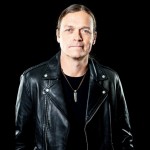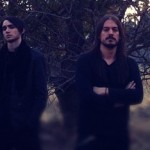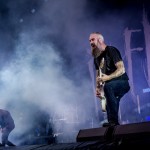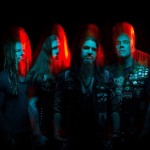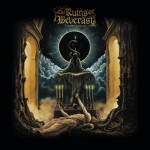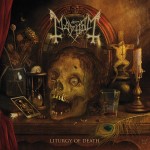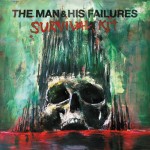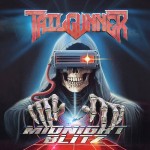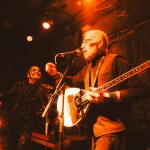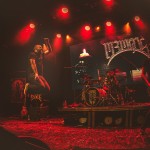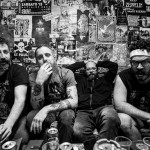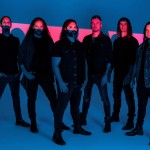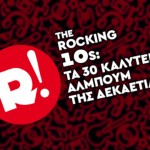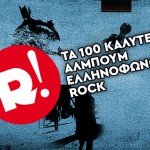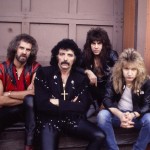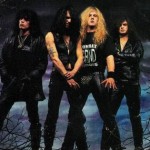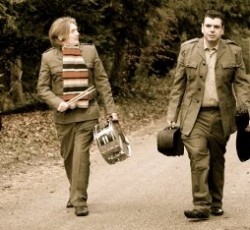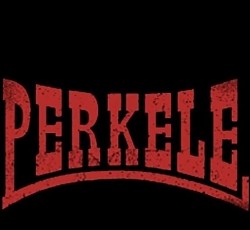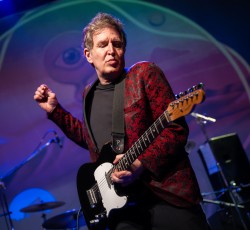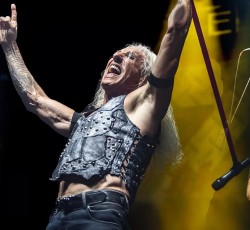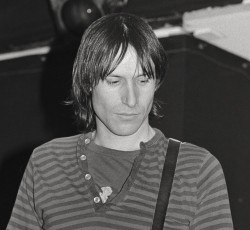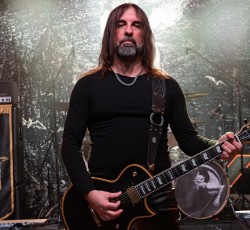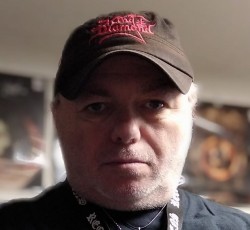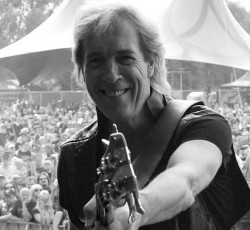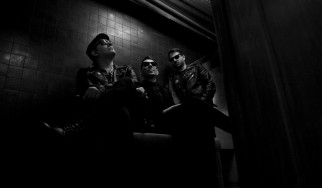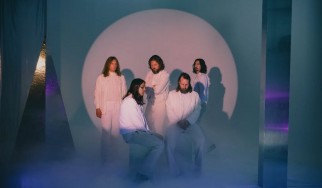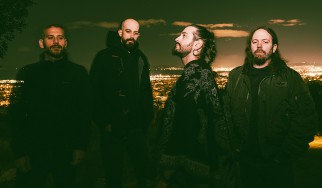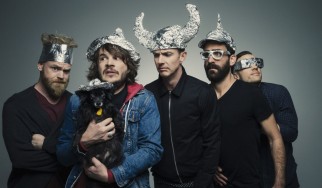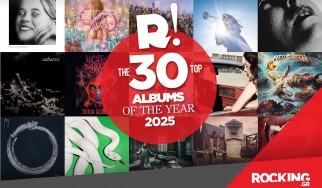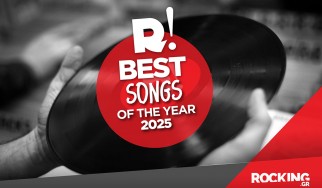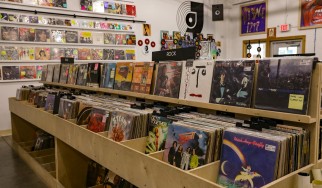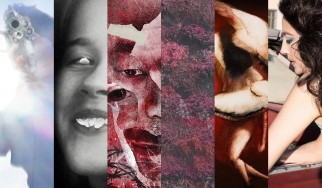Emperor: "In the beginning we were considered the scum of the metal industry"
Ihsahn speaks about the legendary Norwegian black metal bands return Greece after 27 years, their legacy, and of course his upcoming double self-titled album in an all-encompassing interview
Μπορείτε να βρείτε την ελληνική εκδοχή της συνέντευξης εδώ.
There are a couple of bands that when you hear their name, you understand a lot more than what can possibly be said. Emperor is one of them. The Norwegian black metallers will return to Greece after 27 years, for a unique concert, bringing with them the memories and the glamor of a legendary past. With the band's recent occasional reunions being particularly eclectic, April 6th automatically marks a historic date. So, we couldn't pass up the opportunity to get back in touch with Ihsahn to answer everything we'd like to ask.
The versatile artist, of course, intends to release an ambitious double self-titled album next month. Therefore, having already heard of his new venture, the occasion (and our joy) was twofold. In what is Ihsahn's fourth interview with us in recent years (following 2016, 2018 and 2019), he returns to the early days of Emperor and specifically "In The Nightside Eclipse" and "Anthems To The Welkin At Dusk", breaking down why there will be no new music, but also how he perceives black metal today, comments on the challenges of reunification, introduces us to the aesthetic and creative core that runs through his entire discography, commenting on the current state of metal. And all this, with intense self-criticism and an honest attitude.

Hello Ihsahn!
How are you?
I'm great. And how are you?
I'm good. Thank you.
Thank you for having the time to do this interview. You’ve already conducted a few interviews in the past with other guys from our team, but we're always glad to have you because we love your works both as a solo artist and with Emperor of course!
Thank you! Thank you so much!
And it’s also great to have the chance to talk with you, because you have two great occasions to talk about. The first one is of course your first visit in Greece with Emperor 27 years since your last one here.
It's been that much? (laughs)
The other one is your new upcoming, self-titled album. So, we'll talk about both of them if we have the time.
Absolutely!
There are really strong metal and black metal roots in Greece
So could we start with Emperor, as I can assure you, we are all very, very so eager for the show!
Yeah, we too! I mean, we do all these shows and for some reason some of the countries we haven’t managed to go… I haven't really been conscious about that… it's been 27 years? That's crazy! Because I've been back to Greece playing live shows and I've been there several times on vacation. But it's just one of those things. Last time I played Greece, Athens it was brilliant. I had a great time. And I'm sure it'll be really cool to come back with Emperor as well. There are really strong metal and black metal roots in Greece. So yeah, there's a strong connection there from way back I think…
We've often felt it's easier to get the right atmosphere for our music in bigger clubs than open-air festivals
Yeah, there is… And to be honest, you have been periodically active in the last years with selective live shows in festivals mainly. But what really urged you towards wanting to play late in countries and regions like Greece that are not considered a popular option for such special occasions?
We’ve had this privilege of people still want us to play all these old songs. In the beginning, as you said, it was very exclusively for festivals and so on. But we've kind of expanded on that. We've been to Australia, we've been back and forth to Japan a few times, last year we had the first opportunity to go in South America and play some select shows and we did some select shows in US, in different cities. We're very humbled to the fact that people still want to see us.
It's rather coincidental, really, to be able to go to places where we haven't played before or even where we haven't played in a very long time. From the different stages we've played, we feel sometimes that you know, it's always great to play festivals, but sometimes it's a different vibe. And for our particular kind of music, we've often felt it's easier to get the right atmosphere for our music in indoors, like in bigger clubs. It's not the type of music to go well with a pub, like a very small club, because that becomes a bit too much intimate. But in bigger indoor clubs and such places, it’s something that works very well.
OK, I get it. Now, of course in between Emperor’s reunion and anniversary shows you've been artistically active with your personal output. So, does it feel when you're on stage and visiting the work of your younger self?
On stage it's very much the same thing. I get that question a lot if it's very different to play with Emperor or my solo stuff. But usually when things are working the way they're supposed to, to me personally it feels like the same thing. Because it doesn't matter. When you're on stage, you're just channeling the music and the setlist that you set out to. And what I do is very-very similar in both bands. It's all about being in the state of mind and leaving the ego on the side of the stage and just let the music do work in a sense. So for me, it feels like you're in this kind of special bubble when you're on stage. And that, for me personally, it's the same whether I play with Emperor or my solo stuff.
It's very boring to be at rehearsal and play "I Am The Black Wizards", but it's never boring to play "I Am The Black Wizards" live
OK, but being an honest artist and being honest with your music, do you have any difficulties or challenges bringing this music live on stage, being the people that you are today, you and your bandmates? Or it doesn't really matter?
That was a concern in the beginning. I was thinking like "could we go back to these songs and perform them with the integrity and truthfulness that I think it deserved?". If we weren't comfortable with the songs or like embarrassed of the songs, what would that feel? I mean, both me and Samoth, we've been very conscious about the fact that some of the reason that we have this privilege today is that Emperor never compromised. There were no compromises ever.
And when we started rehearsing back when we did the first reunion shows, we played these songs so many times growing up, that it's almost like it's part of your DNA. It's there in the spine. You don't even have to try to relearn stuff. It's muscle memory. You just channel the songs. And it's something special too when you play them live, because we have our own relationship to these songs that we played growing up…
When we were a young black metal band in the early 90s, it was not something we did on the side. It was chasing this atmosphere 24/7. We went to rehearsal and played the music and then we would go to someone's room and listen to that kind of music. And then at night we would go out with torches and live the fantasy. There was no in between.
And when we go out and play these songs, and especially places that we haven't played in a long while or haven't played before, we realized there is a lot of people there who also have connected experiences and memories to these songs. They are special to them, like it's for you and me with our favorite bands or songs that we grew up with. And to experience that where the energy merges the audience and what we do… To put it very, very simply, it's a lot of the time, it's very boring to rehearse, to be at rehearsal and play "I Am The Black Wizards", but it's never boring to play "I Am The Black Wizards" live. If that makes sense.
There was really no motivation for becoming "successful"

Of course it does. Now, people still to this day, consider Emperor as something more than a legendary band, but mostly as a pinnacle of Norwegian black metal. 30 years after your beginning, how do you view the band's legacy?
I'm just very, very humbled to the fact that people… to have this chance in the first place. Because, obviously, even when we did "Anthems", the second album, there was really no motivation for becoming "successful". We had a record label who could give us a budget so we could record our songs properly. And our motivation was purely artistic and that it would at some point be released on vinyl like our fellow bandmates and bands that we knew and everything.
Because, you must remember that in the beginning, people absolutely hated what we did. So it's just after the fact it was an underground thing. It had its place… what we lacked in experience. Obviously, I was 16 when we started the Emperor, I was 17 when we recorded "In The Nightside Eclipse". Of course, you don't have a lot experience. But what we lacked in the experience, we made up for in dedication to do what we wanted to create. So, I guess the albums have in that sense a certain youthful energy. And it's like all kinds of music. We communicate something that is universal for being human.
Even if you grow up today, you could still probably, if you're very rebellious or maybe political as a youth, you might find a connection with the Sex Pistols or something like punk from the 70s, even though it's not your era. Because the music, it resonates with where you are yourself. And that's what I'm saying with these Emperor records… I see a lot of young fans at the shows who weren't even born. But maybe they're in that stage of their life now and that kind of expression resonates with them on some level.
I'm not so concerned about legacy and all this. I was never really that bothered with what regards status or all these labels that you put on it that it's supposed to be a competition to any other band or anything. We did what we did to the best of our ability. And I've had a huge privilege to continue my life and my passion for music. I'm still in the same place really, where every time I make a new album, I just try to make it the best album it can be. And I’m trying to put myself in a situation where I'm just as excited about making new music as when I was 16…
We found our platform with "In The Nightside Eclipse" and more confidently built an album on that platform, that is "Anthems"
You were mentioning that you were 16 or 17 when you recorded "In The Nightside Eclipse" and I was thinking that it's been 30 years since then and that this album is a milestone for both the band and the genre. So looking back to it, is there any untold story from the rehearsals maybe that you could share with us? Also, what does this album mean today for you personally?
Well, I'm not sure if I have untold stories. I mean, there's so much stuff that has been documented already, all the stuff that I don't even remember… But I think, looking back and analyzing it… You know, Emperor’s active career, in creative terms, it seems like a long, long time ago for me. Of course, I was 16 when we did the first demo and then already me and Samoth have been playing in bands together since I was 13. But we started Emperor when I was 16 and we quit the band when I was 25!
So - without comparison - it's like The Beatles. It's less than 10 years. Which at my age it's nothing, in that respect. But looking back at "In The Nightside Eclipse", even though it's a debut for me, it's like a collection of previously recorded material and some new songs. It was like, not an experiment, but a phase of the early band where we established the aesthetic platform. And then I feel like "Anthems" is probably the first real album that was written as one thing, based on the experience. I think we found our platform with "In The Nightside Eclipse" and more confidently built an album on that platform, that is "Anthems".
It's very strange that a lot of the black metal bands just stick with the formula
Staying in 1994 it feels like a historic year for the 90s Norwegian metal scene with so many important releases. Do you believe that after that point things changed? You know, most of the bands, Emperor included, tried to experiment with their sound and deviate from the norm. So why do you think that happened?
I think that is just natural progression of things. Because, you must remember that we all just tried to make - when we dedicated ourselves to this black metal aesthetic, we really just had a few bands like early Battery and Celtic Frost, to lean on that was dangerous. And all the Norwegian bands in the scene, in this kind of small community, we did our own interpretation of that aesthetic. But still, the first albums were of course very experimental because we there was no guidebook to how it was supposed to be or how it was supposed to sound.
And I think you see that in a lot of subgenres. If you take 80s metal from the Sunset Strip in Los Angeles, it's easy to hear the difference between WASP and Mötley Crüe. It's easy. Also, the second wave of, British metal with Judas Priest and Iron Maiden, they come from the same place musically. It's still metal, but it’s undeniably different. And I think in a similar sense, whether it's Emperor or Mayhem or Darkthrone or Immortal, it's easy to tell those bands apart from the other records, because we were all just experimenting and trying to push our music further from that starting point.
And, of course, I think it's natural that we continued that journey and kept on experimenting. For to me, it's very strange that a lot of the black metal bands just stick with the formula. When you have an opportunity - at the age of 16-17, which many of us were - to push the envelope of your musical expression, why would you get to do that? At your mid-teens, why would you stop that process? (laughs) If that makes sense...
Yeah, it does.
If you’re a traditional blues band or AC/DC or something, it's an entirely different thing. But, some people choose to go that route. I was always more interested in the progression of things. That's why I got into black metal in the first place. I wasn't satisfied with just heavy metal or thrash metal or death metal. I wanted something more (laughs).
Me and Samoth both felt that we were doing something that the other bands weren't
You wanted something new, something different. Something that was exciting for you, first of all. I get it. And then we get to 1997's classic "Anthems To The Welkin At Dusk" where you famously mention on the back cover "Emperor performs Sophisticated Black Metal Art exclusively". Would you like to explain the purpose of that phrase? Do you still stand by it today?
I think that it was very typical to make some statements back in the day. Because you had nothing to lose. Everybody hated us anyway. When you get that kind of opposition…these albums were absolutely slaughtered by major metal magazines...
Really?
Yeah, yeah, yeah! We were the scum of the metal industry for sure. So it's either you can take that to heart or you could make that the fuel for what you work on. And metal in general, it's opposition, right? It's rebellion. So why wouldn't we stick our middle fingers up and claim our space? It’s the hubris of that era and being young. I think it's a cool thing. It would have coined us maybe because… especially with "Anthems" I was getting much more serious about how I orchestrated and put the keyboard layers and all this more orchestral parts to it all that, all those soundtrack elements into it. I put much more work into it.
So I think me and Samoth both felt that we were doing something that the other bands weren't. It was not a competition thing, but again based on the platform of "Eclipse", we wanted to say that this is what we are. We are this extreme metal black metal sounding band, with this large pathos of orchestral elements.
What kind of Emperor album could we possibly do that would satisfy people’s need?
Now, you've been almost clear that there won't be any Emperor release with new original music. Is it still the case or has something changed about it?
Nothing has changed.
OK. I guess so since there can be no new music…
I get that question a lot. Obviously, every interview I do I am asked if there will be a new Emperor record. It's a compliment in there. People have a good relationship to Emperor and they want more of that experience. Which is understandable. I feel the same way about some of the music that I'm attached to. But on the other hand, what kind of Emperor album could we possibly do that would satisfy that need? If we were to follow the trajectory of where we left off, I ended up writing all the music. For all practical purposes, "Prometheus" was my first solo album in many regards. And then you could argue that what I do solo is the continuation of that.
I don't think that's what people mean. What people mean is that they want us to go back to be thinking and leveled down to the experience level that we had when we were teenagers and try to create on those premises. And you can see how all of that, any of those directions, would lead us into a huge compromise and making an album for the wrong reasons.
I think the integrity of Emperor, even now, is very much rooted in this uncompromising attitude. And personally I respect that people have this relationship to Emperor and I'm very grateful for that, but creatively and following my trajectory of trying to stay truthful and honest and excited about my journey through music, what I do now is where I'm in the right place. If you heard my new record, whether you like that style or not, I think you could tell that it's a labor of love.
What’s the dangerous stuff of 2020s? When is that coming?
I think it's great and we'll come to that. But before we do, I'd like to ask you the following. Black metal still resonates with many people and it is a music genre that keeps evolving, experimenting, getting bigger and deeper. Do you believe that the genre can still be relevant today? In other words, what would interest you in today's black metal band and what is black metal for you today?
Well, black metal for me is today exactly what it was back then. To me it's always been a certain atmosphere, a certain feeling, and that's why I've said so many times that Diamanda Galas could be as black metal to me as early Bathory. Because it conjures up the same feeling. And I guess I would say listen to Jerry Goldsmith's soundtrack for "The Omen". It also put puts me into that. So for me, it's not about the distorted guitar and blast beats. Black Metal to me is like an aesthetic direction if you will. There's a lot of bands that pay homage to how it used to be, and I'm sure there are bands who are developing it further, but to me, it's not that important. I’m just curiously on the outlines of everything and I’m just waiting for like "what's the next dangerous thing?". What do teenagers come up with? What’s the dangerous stuff of 2020s? When is that coming? Not that I'm hoping for something bad to happen… (laughs). But where's the next level?
Every decade had its time, where it's like "Oh, this is the most extreme". And then another decade, it's even more. So I'm still waiting for it. It seems that metal in general is more like a melting pot now. I have seen that quite recently… I don't remember the name of the band, but I was introduced to very new band and you could clearly hear they were influenced by early black metal, but also djent stuff and also death metal and Marilyn Manson. But for them, who were very young, that was the metal of the 90s and early 2000s. To them it was like this the same thing.
But for us, who lived metal back then, Florida death metal and Norwegian black metal and Marilyn Manson or whatever, they were entirely separate things. But from their perspective, it's a source of inspiration, which is more or less the same. And they mix and match it together on something new. I'm, of course, passionate about metal and my son is also very into metal. He introduced me to some stuff, but he also tends to go with Gojira and Opeth and all the good stuff from back in the day. It just has to be something new that is fresh and dangerous and will contribute something new. Because now it's seems there's a lot of a melting pot of things.

Thinking about modern metal I remembered you were a guest contributor in Trivium’s Matt Heaffy’s Ibaraki project. "Rashomon" was a really interesting album. In fact, I loved the album. So how was your experience with that? It was kind of a link of yesterday's and today's metal music in a way with you two collaborating
Yeah, that was very good. I've been friends with Matt for over a decade. Since the first time we met he said "man, someday I’d want you to produce a solo album for me". He's always been a fan of the genre and he wanted to do a black metal album style. Of course, me and him, we were so busy both of us, but luckily in the pandemic we both had time. So it was a good opportunity to dig deep into that. I think the project changed a lot because the process was really us talking about perspective and I think his original idea was to do something in the spirit of Norwegian black metal.
And I said, because he's half Japanese, "why don't you instead speaking about Norse Gods, why don't you try to find the similar archetypes in your Japanese heritage?". Because then it comes from a place that is real. And all these old mythical stories and archetypes are very much the same in different cultures. So it just made it more personal to him. And it really opened up the perspective on what it could be. I think it was very interesting. And I'm very proud of what we managed to create.
...that's why I went "OK, I'll do metal album, but I will just play with the harmonics and the tonal world of soundtracks"
So, now the time has come to talk about your new great album. Once again congrats for it, I think it sounds great. It's been six years since "Amr" and it arguably sounds like a project that encapsulates Ihsahn in 2024. So what are you aiming with this double release? Because you release it as a progressive and as an orchestral album simultaneously. And how would you like your audience to approach this release?
Well, I have been experimenting previously. In between this and the last full length album, I did this EP called "Telemark", where I sang in Norwegian and it weally was like a very old-school type of expression. And then I did an EP which is the entire opposite, like "Pharos", which was like almost like a progressive pop, indie-rock kind of thing. So a bit to this side, a bit to that. And I think I wanted to renew myself. Of course to not do the same kind of thing over again as mentioned earlier. I want to put myself in a position where I'm just as excited about making something as when I first started.
But with this one I thought, if you take a straight line from my beginning up until now, of course there are parallels between the releases, but down the center is the metal band screaming vocals, and it's also the orchestral elements that have followed me from the start. Sometimes in a bigger degree, sometimes less. And the reason for us bringing keyboards into Emperor in the first place was that we listened to a lot of these old horror movie soundtracks or soundtracks in general. You know, John Williams, Jerry Goldsmith, Bernard Herman, John Carpenter with his synthesizer stuff and everything, it had this atmosphere. And I wanted to take those core elements and have them… So, subjectively, from my experience, since I'm self-taught and everything, I just tried to elevate that to a new level for myself.
All in all, it’s the hardest album I've ever made. It really was a huge challenge for me to do
And that's why I went "OK, I'll do metal album, but I will just play with the harmonics and the tonal world of soundtracks". And before I started writing anything, I decided that I want to write the music in such a way that the orchestrations will support the metal production but also write them and arrange them in such a way that they would function independently. That was the big challenge, not just to fit the orchestrations to the metal, which I've done quite a lot of that. But to make that puzzle work, so that when presented without the metal versions, it's essentially the same music. But then you can experience more subtle nuances of the same music. And maybe it's dynamically very different. I've used the example of the first single "Pilgrimage Oblivion", which is probably the hardest song on the album and it starts off immediately. It has screaming, blast beats and raging guitars, but if you listen to the parallel orchestral track, you can only hear the whispering tremble of cellos. It’s the same riff and the same music, but it gives a similar, but still different expression because of the arrangement.
All in all, it’s the hardest album I've ever made. It really was a huge challenge for me to do. But at the same time the most gratifying. And then I'm talking all this subjectively because as I said, based on my experience, I set the goal very, very high also from a technical perspective being able to pull it off. I'm extremely proud of the of the outcome. And the gratification is that I'm closing in on 50, and I can still be in a place where I learned so much and have all this excitement and inspiration to work on my music. Doing the hard work with this album made me even more excited to do the next one. Again, like we talked about, it's all about growing and learning new stuff and explore. It's like exploration but just in a musical world.

Is it a statement that you decided to name it after yourself, to be the self-titled album?
No, not really. I realize that that's how it's perceived. But for me, it's a tradition that an artist or band have a self-titled album. Either as the first one like Iron Maiden, or somewhere down the line. And for me it became one of those somewhere down the line.
And it was two reasons for it really. First of all, because it was very hard, because there are two parallel storylines and this duality of everything in this album, there's so many elements going into it. So, it was hard for me to find a title that would gather all of that into one thing that could illustrate what it was. And the other is that in that process I found that at the heart of it, it's very down the center - musically and aesthetically - of what I’ve been doing, it's like very core to what I do. And I thought "well, this is as good as time as any to do a self-title album". I wasn't intending it to be such a statement, but I understand that from a popular cultural perspective that's apparently something people do to make a statement. Maybe in time it will show it was a statement. Who knows? (laughs)
Put me on the stage and I'll do my do my best. I just do my thing. I don't care
From being considered an extreme metal artist, you are now considered a prog artist. Are you feeling OK and comfortable with being labeled as prog?
Yeah! It just goes for progressive. I guess "prog" indicates growth and the progressiveness and not stopping at one destination. In that sense, yes. But, to be to be quite honest, in my three decades plus career, I can assure you I've been labeled and called absolutely anything you can imagine. So, labels and what people think of me, I've given up having any opinion honestly…
But, I think it's strange that people find it so hard. Because I get that question a lot, because sometimes I've played like Maryland Death fest in the US, which is like a typical death metal, old school death metal festival and I've also played Prog/Power festival in Atlanta. Sometimes I'll play progressive festivals and other times I will play extreme metal festivals. And sometimes I'll play the big festivals, where there's everything from Whitesnake to Emperor (laughs). I don't care. Put me on the stage and I'll do my do my best. I just do my thing. I don't care.
It’s no wonder why Sleep Token are very successful
Last question. I was reading our interview in 2019 and we were asking you about new music that you’ve been listening at the time and you had mentioned Sleep Token. In 2024 Sleep Token have become a phenomenon and you've talked about them five years ago, so how do you feel about their rise? And what do you think about them now? Are they still making sense for you?
Yeah, absolutely! I know I said it, because I was introduced to Sleep Token even before the first album was released. Because they were on Spinefarm and Candlelight and Spinefarm is the same people, so I was sent the album before it came out. And then, with the mask and everything it just makes perfect sense. I was waiting for that. Like "OK, when is the band coming along, where they're kind of mixing the dark aspects of metal with the darker aspects of R&B, like the Weeknd and hip hop and all of this?". And yeah, of course I was just waiting for it to happen to meld. And they did it.
I think it's very interesting. You see that with a lot of bands, now that with social media, this is only just my own kind of observations or take on things, we live in a world now where with all the social media and everything is so private. And you can see what your favorite artists have for dinner or breakfast. And it just it has nothing to do with what it was. We we're drawn to metal because of the darkness and ritual to it, with the masks and everything. You see Kiss or King Diamond and it's larger than life. You see that in this great success with something like Rammstein or even more bands like Ghost, but also Sleep Token. Even though Tobias Forge was kind of found out, for being the behind the Papa mask, the audience still wants to play along to the illusion, because that's what matters. They want to experience, something on a different dimension. They're not there to look at their friends or dads in their jeans… I think it's very interesting for bands like Sleep Token. It’s no wonder they're very good at what they do and so no wonder they're very successful.
I have to thank you for this really interesting interview, because time is running out! Thank you very much.
Thank you so much for your support and I hope to see you in in Athens in not too long.

